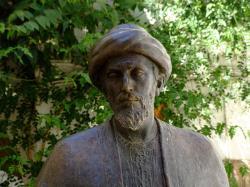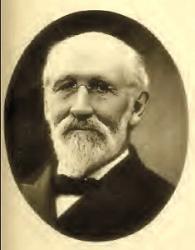Planning worship?
Check out our sister site, ZeteoSearch.org,
for 20+ additional resources related to your search.
- |
User Links
Person Results
George P. Simmonds
1890 - 1991 Person Name: George P. Simmonds, 1890-1991 Translator of "The God of Abraham Praise (Al Dios de Abraham, loor)" in Santo, Santo, Santo Used pseudonyms G Paul S., J. Paul Simon, and J. Pablo Símon
George P. Simmonds
Abraham Wolf Binder
1895 - 1966 Person Name: A. W. Binder Arranger of "[Yigdal Eloheem chai v'-yish tabach]" in Union Hymnal, Songs and Prayers for Jewish Worship. 3rd ed. Revised and enlarged.
Abraham Wolf Binder
Shirley Erena Murray
1931 - 2020 Person Name: Shirley Erana Murray Author of "Community of Christ" in The New Century Hymnal Shirley Erena Murray (b. Invercargill, New Zealand, 1931) studied music as an undergraduate but received a master’s degree (with honors) in classics and French from Otago University. Her upbringing was Methodist, but she became a Presbyterian when she married the Reverend John Stewart Murray, who was a moderator of the Presbyterian Church of New Zealand. Shirley began her career as a teacher of languages, but she became more active in Amnesty International, and for eight years she served the Labor Party Research Unit of Parliament. Her involvement in these organizations has enriched her writing of hymns, which address human rights, women’s concerns, justice, peace, the integrity of creation, and the unity of the church. Many of her hymns have been performed in CCA and WCC assemblies. In recognition for her service as a writer of hymns, the New Zealand government honored her as a Member of the New Zealand Order of Merit on the Queen’s birthday on 3 June 2001. Through Hope Publishing House, Murray has published three collections of her hymns: In Every Corner Sing (eighty-four hymns, 1992), Everyday in Your Spirit (forty-one hymns, 1996), and Faith Makes the Song (fifty hymns, 2002). The New Zealand Hymnbook Trust, for which she worked for a long time, has also published many of her texts (cf. back cover, Faith Makes the Song). In 2009, Otaga University conferred on her an honorary doctorate in literature for her contribution to the art of hymn writing.
I-to Loh, Hymnal Companion to “Sound the Bamboo”: Asian Hymns in Their Cultural and Liturgical Context, p. 468, ©2011 GIA Publications, Inc., Chicago
Shirley Erena Murray
Gerre Hancock
1934 - 2012 Harmonizer of "LEONI" in The United Methodist Hymnal Music Supplement
Gerre Hancock
Carl P. Daw Jr.
b. 1944 Author of "O God, Our Sovereign God" in Christian Worship Carl P. Daw, Jr. (b. Louisville, KY, 1944) is the son of a Baptist minister. He holds a PhD degree in English (University of Virginia) and taught English from 1970-1979 at the College of William and Mary, Williamsburg, Virginia. As an Episcopal priest (MDiv, 1981, University of the South, Sewanee, Tennesee) he served several congregations in Virginia, Connecticut and Pennsylvania. From 1996-2009 he served as the Executive Director of The Hymn Society in the United States and Canada. Carl Daw began to write hymns as a consultant member of the Text committee for The Hymnal 1982, and his many texts often appeared first in several small collections, including A Year of Grace: Hymns for the Church Year (1990); To Sing God’s Praise (1992), New Psalms and Hymns and Spiritual Songs (1996), Gathered for Worship (2006). Other publications include A Hymntune Psalter (2 volumes, 1988-1989) and Breaking the Word: Essays on the Liturgical Dimensions of Preaching (1994, for which he served as editor and contributed two essays. In 2002 a collection of 25 of his hymns in Japanese was published by the United Church of Christ in Japan. He wrote Glory to God: A Companion (2016) for the 2013 hymnal of the Presbyterian Church (U.S.A.).
Emily Brink
Carl P. Daw Jr.
Moses Maimonides

1135 - 1204 Person Name: Moses Maimonides, 12th century Author of "Yigdal Elohim Chai (The God of Abraham Praise)" in The New Century Hymnal Moses Maimonides, original name Moses Ben Maimon, also called Rambam, Arabic name Abū ʿImran Mūsā ibn Maymūn ibn ʿUbayd Allāh (born March 30, 1135, Córdoba [Spain]—died Dec. 13, 1204, Egypt), Jewish philosopher, jurist, and physician, the foremost intellectual figure of medieval Judaism. His first major work, begun at age 23 and completed 10 years later, was a commentary on the Mishna, the collected Jewish oral laws. A monumental code of Jewish law followed in Hebrew, The Guide for the Perplexed in Arabic, and numerous other works, many of major importance. His contributions in religion, philosophy, and medicine have influenced Jewish and non-Jewish scholars alike.
--www.britannica.com/
Maimonides's full name was Moses ben Maimon; in Hebrew he is known by the acronym of Rabbi Moses ben Maimon, Rambam. He was born in Spain shortly before the fanatical Muslim Almohades came to power there. To avoid persecution by the Muslim sect — which was wont to offer Jews and Christians the choice of conversion to Islam or death — Maimonides fled with his family, first to Morocco, later to Israel, and finally to Egypt. He apparently hoped to continue his studies for several years more, but when his brother David, a jewelry merchant, perished in the Indian Ocean with much of the family's fortune, he had to begin earning money. He probably started practicing medicine at this time.
Maimonides's major contribution to Jewish life remains the Mishneh Torah, his code of Jewish law. His intention was to compose a book that would guide Jews on how to behave in all situations just by reading the Torah and his code, without having to expend large amounts of time searching through the Talmud. Needless to say, this provocative rationale did not endear Maimonides to many traditional Jews, who feared that people would rely on his code and no longer study the Talmud. Despite sometimes intense opposition, the Mishneh Torah became a standard guide to Jewish practice: It later served as the model for the Shulkhan Arukh, the sixteenthcentury code of Jewish law that is still regarded as authoritative by Orthodox Jews.
Philosophically, Maimonides was a religious rationalist. His damning attacks on people who held ideas he regarded as primitive — those, for example, who understood literally such biblical expressions as “the finger of God” so infuriated his opponents that they proscribed parts of his code and all of The Guide to the Perplexed. Other, more liberal, spirits forbade study of the Guide to anyone not of mature years. An old joke has it that these rabbis feared that a Jew would start reading a section in the Guide in which Maimonides summarizes a rationalist attack on religion, and fall asleep before reading Maimonides's counterattack-thereby spending the night as a heretic.
How Maimonides's opponents reacted to his works was no joke, however. Three leading rabbis in France denounced his books to the Dominicans, who headed the French Inquisition. The Inquisitors were only too happy to intervene and burn the books. Eight years later, when the Dominicans started burning the Talmud, one of the rabbis involved, Jonah Gerondi, concluded that God was punishing him and French Jewry for their unjust condemnation of Maimonides. He resolved to travel to Maimonides's grave in Tiberias, in Israel, to request forgiveness.
Throughout most of the Jewish world, Maimonides remained a hero, of course. When he died, Egyptian Jews observed three full days of mourning, and applied to his death the biblical verse "The ark of the Lord has been taken" (I Samuel 4:11).
To this day, Maimonides and the FrenchJewish sage Rashi are the most widely studied Jewish scholars. Contemporary yeshiva students generally focus on the Mishneh Torah, and his Book of Commandments (Sefer haMitzvot) a compilation of the Torah's 613 commandments. Maimonides also formulated a credo of Judaism expressed in thirteen articles of faith, a popular reworking of which (the Yigdal prayer) appears in most Jewish prayerbooks. Among other things, this credo affirms belief in the oneness of God, the divine origins of the Torah, and the afterlife. Its twelfth statement of faith — “I believe with a full heart in the coming of the Messiah, and even though he may tarry I will still wait for him” — was often among the last words said by Jews being marched into Nazi gas chambers.
Maimonides was one of the few Jewish thinkers whose teachings also influenced the nonJewish world; much of his philosophical writings in the Guide were about God and other theological issues of general, not exclusively Jewish, interest. Thomas Aquinas refers in his writings to “Rabbi Moses,” and shows considerable familiarity with the Guide. In 1985, on the 850th anniversary of Maimonides's birth, Pakistan and Cuba — which do not recognize Israel — were among the cosponsors of a UNESCO conference in Paris on Maimonides. Vitali Naumkin, a Soviet scholar, observed on this occasion: “;Maimonides is perhaps the only philosopher in the Middle Ages, perhaps even now, who symbolizes a confluence of four cultures: GrecoRoman, Arab, Jewish, and Western.” More remarkably, Abderrahmane Badawi, a Muslim professor from Kuwait University, declared: “I regard him first and foremost as an Arab thinker.” This sentiment was echoed by Saudi Arabian professor Huseyin Atay, who claimed that “if you didn't know he was Jewish, you might easily make the mistake of saying that a Muslim was writing.” That is, if you didn't read any of his Jewish writings. Maimonides scholar Shlomo Pines delivered perhaps the most accurate assessment at the conference: “Maimonides is the most influential Jewish thinker of the Middle Ages, and quite possibly of all time” (Time magazine, December 23, 1985). As a popular Jewish expression of the Middle Ages declares: “From Moses [of the Torah] to Moses [Maimonides] there was none like Moses.”
Source: Joseph Telushkin. Jewish Literacy. NY: William Morrow and Co., 1991. Reprinted by permission of the author.
--www.jewishvirtuallibrary.org/jsource/biography/Maimonides.html
Moses Maimonides
Newton Mann

1836 - 1926 Translator of "Yigdal Elohim Chai (The God of Abraham Praise)" in The New Century Hymnal Mann, Rev. Newton. (Cazenovia, New York, January 16, 1836--July 25, 1926, Chicago, Illinois). He graduated from Cazenovia Academy, and during the Civil War served as head of the Western Sanitary Commission. He then entered the Unitarian ministry and was ordained as pastor of the church in Kenosha, Wisconsin, which he organized and served for three years. He later served churches in Troy, New York, 1868-1870; Rochester, N.Y., 1870-1888; and Omaha, Nebraska, 1888-1908, after which he retired to Chicago. His only connection with hymnody was his versification of an English translation of the Jewish creedal statement known as the Yigdal. His verse, which has not survived, was later recast by Rev. W.C. Gannett. In its present form the hymn is probably mostly the work of Gannett, but Mann should be credited with having drafted its earlier form. See also Foote, Three Centuries of American Hymnody, pp.339-340.
--Henry Wilder Foote, DNAH Archives
Newton Mann
Joseph T. Cooper
1819 - 1879 Person Name: J. T. Cooper Harmonizer of "LEONI" in The Song Companion to the Scriptures Mr. J. T. Cooper, associate of the Philharmonic Society, musical editor of the first issue of Bishope Bickersteth’s Hymnal Companion to the Prayer Book and also editor of the Church Tune Book), died a few years ago whilst organist of Christ Church, Newgate Street. He was an accomplished musician, a brilliant organist and pianist, an accurate and ripe scholar, and a keen antiquary.
from The Organist and Choirmaster, Volume 4 (1896)
Joseph T. Cooper


 My Starred Hymns
My Starred Hymns


